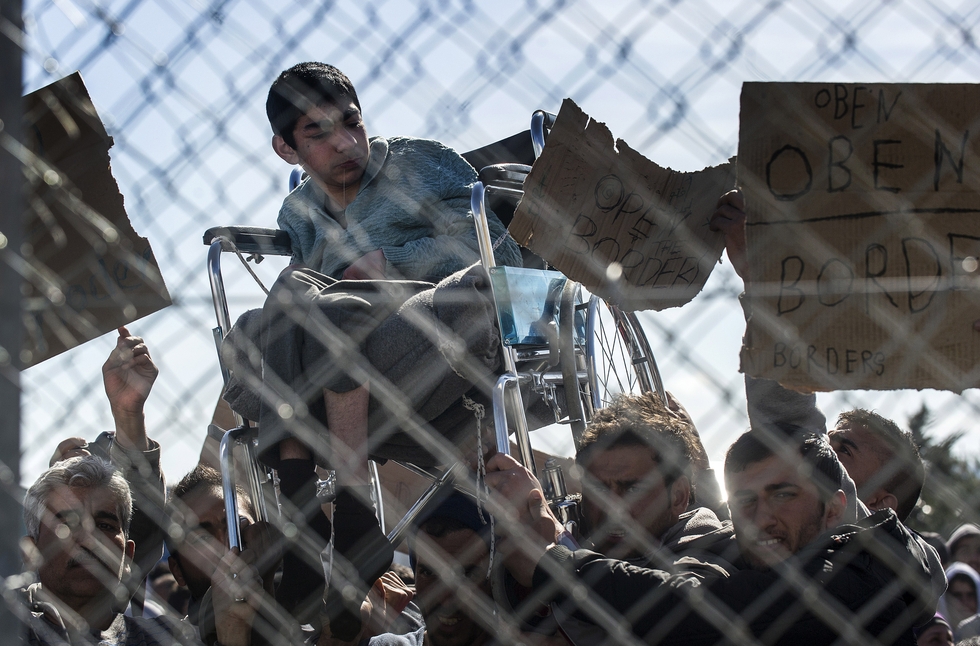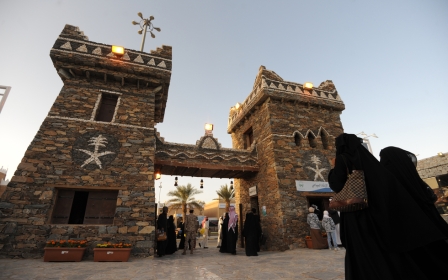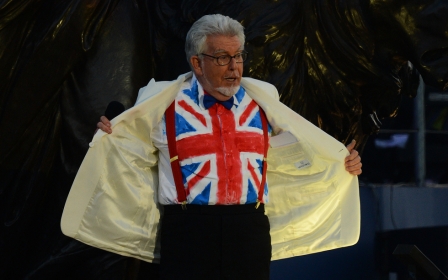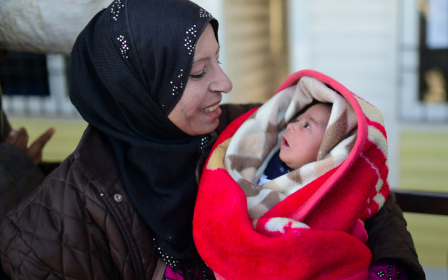Bring on the refugee crisis in Europe: The Middle East needs it

The images of refugees scuffling passed EU borders late last year will continue to haunt our collective consciousness for decades to come. The suffering, indignity and overall despair of men, women and children fleeing war became starkly apparent when footage was circulated around the world. A misery that was triggered by the attack on Afghanistan and which continued with the wars on Iraq, Libya, Syria and more recently Yemen.
From an Arab perspective the images were as painful to watch as they were to comprehend. Mothers beaten up and humiliated by border police, babies thrown and tugged above barbwires. The reality is that these scenes have always been associated with war but modern technology brought home - literally - the full scale of its horror.
The sympathy for Syria's war-torn people, expressed in the aftermath of the death of little Alan Kurdi, was palpable in the weeks that followed the infant's drowning.
Yet slowly the vocabulary surrounding the case of the refugees was insidiously being changed. They were no longer refugees. Those arriving in Europe were now described as migrants, implying a financial motivation to their flight.
The groups soon became "swarms" which then turned into "invading hordes".
Things came to a head in Cologne when a group of known criminals decided to capitalise on the New Year's Eve party mood by groping, assaulting and stealing from women. Germany and much of Europe was whipped into an indescribable racist frenzy that continues to poison the issue of refugees to this day.
Mirroring other major German events which unfortunately target women, petty criminals of mostly North African origin scratched the surface of European sensibility and revealed its barely hidden bigoted side. A handful of thieves - as against early reports, the public prosecutor confirmed that only three out of the 58 arrested were refugees - would go on to impact the entire refugee population now being targeted in the media. From the left wing to the right wing, the press united against them, aided in great part by social media which widely circulated fake photographs of battered women.
The thefts and sexual assaults became symptomatic of the mythic refugee mindset: fleeing war, destruction and death in order to arrive to Europe to abuse its women.
A shameful epithet was even attributed to these victims of war: "rapefugees".
Everyone appeared to enjoy this turn of events. The right-wing parties indulged in their "told you so moments", left-wing liberals recognising that "they'd always been fully aware of cultural differences", with liberals and greens pointing to the "overcrowding" of the old continent and its inability to accommodate these cumbersome new arrivals.
For the first time in decades, the issue of refugees created consensus among all of Europe's elite. For the first time in decades the tangible human suffering caused by war by the West penetrated Europe.
A sheltered continent
For the past 70 years Europe has enjoyed relative peace and prosperity. After two crushing world wars that left as many as 100 million dead, three generations of Europeans have only known conflict through the lens of Hollywood directors.
Despite the wholly unnecessary war and consequent invasion of Iraq, Europe and Britain in particular, which was central to its destruction, were sheltered from the effects of that gratuitous act of aggression. Five million Iraqis were forced into exile. However just like the first wave of war refugees caused by the first Gulf war, the majority preferred neighbouring Arab countries as well as Turkey or Iran.
Afghanistan's war refugees settled primarily in Pakistan, causing untold strain on the barely 40-year-old country at the time, and indirectly importing much of the conflict into its borders.
The NATO onslaught on Libya in 2011 saw half of Libya's population escape to Tunisia and Egypt with smaller numbers settling in Algeria or Morocco. As for the bulk of Syrian refugees they first crossed over to Lebanon, now host to some two million Syrians out of a population of six million, as well as Jordan and Turkey.
The rest escaped to Egypt or Algeria as well as to the Gulf monarchies.
Those claiming Arab nations haven't "done their bit" in solidarity with their Syrian brethren are fuelling the flames of anti-Arab racism which has become tragically normalised over the years.
For Europe, war and its consequences are finally nearing its borders. For years, decades in fact, European people have seen the politicians they freely elect wage wars from the comfort of their cushy offices in London, Washington or Paris. Some object, even going as far as protesting on the odd afternoon, while the majority simply accept the wisdom behind such criminal politics.
France for instance has a long and inspiring tradition of opposing authority with marches ingrained in the nation's culture. When former French President Nicolas Sarkozy spearheaded the war in Libya, which has transformed the country into a failed state, not one notable voice opposed the unnecessary onslaught.
In London, where former British Prime Minister Tony Blair, has been hugely discredited over his role in Iraq, there was no resistance to the war against Libya and those who protested against British involvement in Syria could barely fill the lawn opposite the Houses of Parliament last December.
The Eastern 'invasion'
Reaction to the arrival of refugees appears to have galvanised European public opinion however. As long as war and its atrocious consequences were mere visuals on a TV screen few cared to react to it, but now that refugees are coming into Europe, the most apolitical have risen up to condemn this attack on "European identity".
What a group of war victims will do to affect the fabric of Europe is difficult to predict but with racism and Islamophobia now mainstream, the deeply held belief of average Europeans is that their lives are at risk.
When those Middle Easterners are indeed at risk of bombs and drones, few if any reacted, but now that middle-class mums are uncomfortable that their children will be sitting next to darker skinned peoples sporting turbans or headscarves in the class room, things are different.
Syria is suffering a major brain drain and this will negatively impact its reconstruction efforts once war finally comes to an end. From a Syrian perspective, this refugee crisis is not good but for the future of the Arab and wider Muslim world where wars have been started for no apparent and truthful reason, this may well be a positive turning point.
For too long, Western peoples who have always taken pride in their democratic institutions, could perhaps devote some energy and political campaigning to stop wars waged against foreigners.
More political energy is devoted to animal welfare than was in opposing the war in Iraq that left one million people killed.
Across the Western world gay marriage, unthinkable some 30 years ago, was recently celebrated across social media. This major social change was achieved through active political campaigning, yet not a fraction of that political momentum was devoted to stopping the bombing of civilians in Tripoli or Baghdad.
Yet now that Tripoli or Baghdad are coming to Berlin and Paris, those who elected the Sarkozys, Blairs and other war-mongering leaders will think twice about their vote and their political apathy.
It's time citizens of democracies who have a say in their nations politics became more actively involved in opposing wars, just as they have in relation to other issues. In that sense and at risk of sounding cynical, this refugee crisis is just what the Middle East needs.
Perhaps then, David Cameron will think twice before signing a piece of paper in front of jeering technocrats the right of life or death over Syrians and Libyans.
- Hafsa Kara-Mustapha is a journalist, political analyst and commentator with a special focus on the Middle East and Africa. She has worked for the FT group and Reuters and her work has been published in the Middle East magazine, Jane's Foreign report and a host of international publications. A regular pundit on TV and radio, Hafsa can regularly be seen on RT and Press TV.
The views expressed in this article belong to the author and do not necessarily reflect the editorial policy of Middle East Eye.
Photo: Refugees and migrants carry a teenager on a wheelchair as they demonstrate behind a fence and barbed wire at the Greek-Macedonian border, near Gevgelija, on 27 February, 2016 (AFP).
New MEE newsletter: Jerusalem Dispatch
Sign up to get the latest insights and analysis on Israel-Palestine, alongside Turkey Unpacked and other MEE newsletters
Middle East Eye delivers independent and unrivalled coverage and analysis of the Middle East, North Africa and beyond. To learn more about republishing this content and the associated fees, please fill out this form. More about MEE can be found here.





